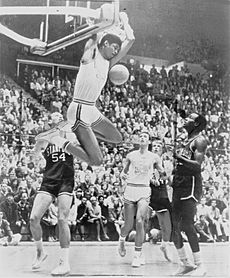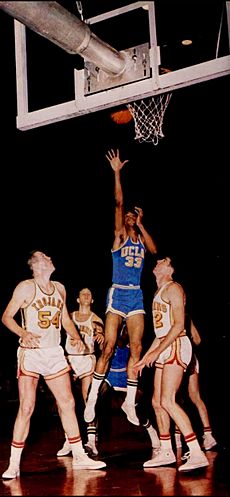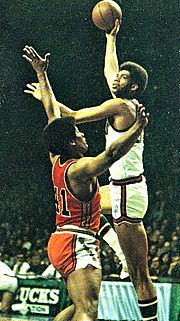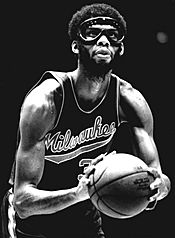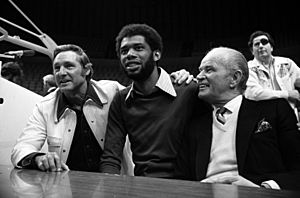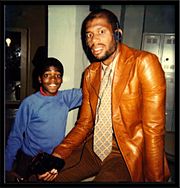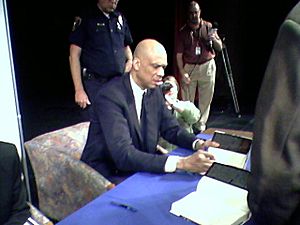Kareem Abdul-Jabbar facts for kids
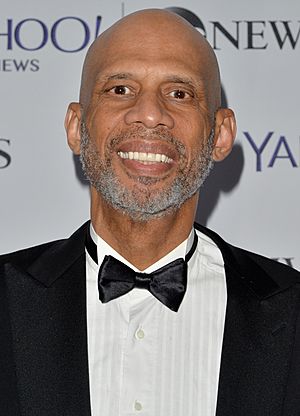
Abdul-Jabbar in 2014
|
|
| Personal information | |
|---|---|
| Born | April 16, 1947 New York City, New York U.S. |
| High school | Power Memorial (New York City, New York) |
| Listed height | 7 ft 2 in (2.18 m) |
| Listed weight | 225 lb (102 kg) |
| Career information | |
| College | UCLA (1966–1969) |
| NBA Draft | 1969 / Round: 1 / Pick: 1st overall |
| Selected by the Milwaukee Bucks | |
| Pro career | 1969–1989 |
| Coaching career | 1998–2011 |
| Career history | |
| As player: | |
| 1969–1975 | Milwaukee Bucks |
| 1975–1989 | Los Angeles Lakers |
| As coach: | |
| 1998–1999 | Alchesay HS (assistant) |
| 2000 | Los Angeles Clippers (assistant) |
| 2002 | Oklahoma Storm |
| 2005–2011 | Los Angeles Lakers (assistant) |
| Career highlights and awards | |
As head coach:
As assistant coach:
|
|
| Career NBA statistics | |
| Points | 38,387 (24.6 ppg) |
| Rebounds | 17,440 (11.2 rpg) |
| Assists | 5,660 (3.6 apg) |
Kareem Abdul-Jabbar (born Ferdinand Lewis Alcindor Jr. on April 16, 1947) is a famous American former basketball player. He played for 20 seasons in the National Basketball Association (NBA). He was a star for the Milwaukee Bucks and Los Angeles Lakers. Before that, he played college basketball for the UCLA Bruins.
Kareem is in the Naismith Memorial Basketball Hall of Fame. He won a record six NBA Most Valuable Player (MVP) awards. He was chosen for the NBA All-Star team 19 times. He was also named to the All-NBA Team 15 times and the NBA All-Defensive Team 11 times. As a player, he won six NBA championships. He also won two more championships as an assistant coach. He was named NBA Finals MVP twice. Many people think he is one of the greatest basketball players ever. He held the NBA's all-time scoring record from 1984 until LeBron James passed him in 2023.
He was known as Lew Alcindor when he played high school basketball at Power Memorial in New York City. There, his team won 71 games in a row. He then played college basketball for the UCLA Bruins. He won three national championships in a row under coach John Wooden. Alcindor was named the most outstanding player of the NCAA tournament three times, which is a record.
The Milwaukee Bucks picked him first in the 1969 NBA draft. He played six seasons with the Bucks. In 1971, at age 24, he led the Bucks to their first NBA championship. After this, he changed his name to Kareem Abdul-Jabbar. He was famous for his special shot called the skyhook. This shot made him one of the best scorers in the league. In 1975, he was traded to the Lakers. He played his last 14 seasons with them. During this time, the Lakers won five more NBA championships. Kareem was a big part of the Lakers' "Showtime" era. In his 20-year career, his teams made the playoffs 18 times. They reached the NBA Finals ten times.
When he retired in 1989 at age 42, Abdul-Jabbar held many NBA records. He was the all-time leader in points (38,387) and games played (1,560). He also led in minutes played (57,446) and field goals made (15,837). He is still the all-time leader in minutes played and field goals made. He is second in career points and third in total rebounds (17,440) and blocked shots (3,189). ESPN called him the greatest center of all time in 2007. They also named him the greatest college player ever in 2008. In 2016, ESPN ranked him the second-best NBA player ever, after Michael Jordan. Abdul-Jabbar has also been an actor, a coach, and an author. He trained in Jeet Kune Do with Bruce Lee and was in his movie Game of Death (1972). In 2016, President Barack Obama gave him the Presidential Medal of Freedom.
Contents
Early Life and High School Success
Ferdinand Lewis Alcindor Jr. was born in Harlem, New York City, on April 16, 1947. He was the only child of Cora Lillian and Ferdinand Lewis Alcindor Sr. His father was a police officer and jazz musician. His family moved to the Inwood neighborhood of Upper Manhattan when he was three.
Lew was always very tall for his age. By age nine, he was already 5 feet 8 inches tall. When he was 13 or 14, he was 6 feet 8 inches tall. He could already dunk a basketball. Being so tall sometimes made him feel sad because people would stare and comment.
Alcindor went to Power Memorial Academy, a private Catholic high school for boys. He was one of the few Black students there. He wore jersey number 33, which was a tribute to his favorite football player, Mel Triplett. He kept this number throughout his college and pro career. He led his high school team to three New York City Catholic championships in a row. They had a 71-game winning streak and an amazing 79–2 overall record. People called him "The Tower from Power." He scored 2,067 points in high school, which was a New York City record.
During his last year, he had a difficult relationship with his coach. This happened after the coach used a very hurtful word. This experience, along with the Harlem riot of 1964, made Alcindor think deeply about fairness and equality for African Americans. He felt a strong desire to stand up for his community.
College Basketball Career
Alcindor could not go straight to the NBA after high school. At that time, players had to wait until they would have graduated from college. Many schools wanted him to play for them. He chose to go to the University of California, Los Angeles (UCLA). Jackie Robinson, a famous baseball player and UCLA graduate, also encouraged him to go there.
At UCLA, Alcindor was 7 feet 1 inch tall. In his first year, he played on the freshman team because freshmen could not play on the main varsity team yet. On November 27, 1965, he played his first public game for UCLA. It was an exhibition game between the freshman team and the varsity team. The varsity team had won two national championships in a row. But the freshman team won 75–60, with Alcindor scoring 31 points and grabbing 21 rebounds. The freshman team went undefeated that year, with Alcindor averaging 33 points and 21 rebounds per game.
Alcindor joined the varsity team as a sophomore in 1966. He quickly became a national star. In his first game, he scored 56 points, which is still an NCAA record for a player's debut. He later scored 61 points in another game that season. He led UCLA to a perfect 30–0 record and a national championship. This was their third title in four years. After the season, the dunk shot was banned in college basketball to try and stop his dominance. People called it the "Alcindor Rule."
During his college career, Alcindor led UCLA to an amazing record of 88 wins and only two losses. One loss was to the University of Houston. Alcindor had an eye injury in that game. The other loss was to rival USC, who held the ball for a long time because there was no shot clock back then.
Alcindor won many awards in college. He was named National Player of the Year three times (1967–1969). He was also a three-time All-American. He played on three NCAA championship teams (1967, 1968, and 1969). He was named the Most Outstanding Player of the NCAA Tournament three times. In 1969, he became the first-ever Naismith College Player of the Year.
In the summer of 1968, Alcindor converted to Sunni Islam from Catholicism. He chose the Arabic name Kareem Abdul-Jabbar. He did not start using it publicly until 1971. He decided not to try out for the U.S. Olympic basketball team in 1968. He was protesting the unfair treatment of African Americans in the United States. He wanted to show the world that winning a gold medal for the country did not mean much if he still faced unfairness at home.
Alcindor finished his studies and earned a degree in history in 1969. In his free time, he learned martial arts. He studied Jeet Kune Do with Bruce Lee in Los Angeles.
UCLA School Records
Kareem Abdul-Jabbar still holds or shares many records at UCLA:
- Highest career scoring average: 26.4 points per game.
- Most career field goals: 943 (tied).
- Most points in a season: 870 (1967).
- Highest season scoring average: 29.0 (1967).
- Most field goals in a season: 346 (1967).
- Most points in a single game: 61.
- Most points in a college debut game: 56.
Professional Basketball Career
Milwaukee Bucks (1969–1975)
Rookie of the Year and First Championship
The Milwaukee Bucks picked Alcindor first in the 1969 NBA draft. The Bucks were only in their second season. Alcindor's arrival made a huge difference. The Bucks improved from 27 wins to 56 wins in his first year. He was an instant star, ranking second in scoring (28.8 points per game) and third in rebounding (14.5 rebounds per game). He won the NBA Rookie of the Year award.
The next season, the Bucks got star guard Oscar Robertson. Milwaukee then had the best record in the league with 66 wins in the 1970–71 season. This included a record of 20 straight wins. Alcindor won his first of six NBA Most Valuable Player Awards. He also led the league in scoring (31.7 points per game). The Bucks won the NBA title, beating the Baltimore Bullets 4–0 in the 1971 NBA Finals. Alcindor was named the Finals MVP.
Name Change and Continued Dominance
After winning the championship, Alcindor announced he wanted to be called Kareem Abdul-Jabbar. This Muslim name means "noble one, servant of the Almighty."
Abdul-Jabbar continued to be a powerful player for the Bucks. The next year, he led the league in scoring again (34.8 points per game). He became the first player to win the NBA Most Valuable Player award twice in his first three years. In 1974, he won his third MVP award in four years. He was among the top players in scoring, rebounding, and blocked shots. Milwaukee reached the 1974 finals but lost to the Boston Celtics in seven games.
In October 1974, Abdul-Jabbar broke two bones in his right hand after punching the backboard support. This happened after he was accidentally poked in the eye during a game. He missed the first 16 games of the season. When he returned, he started wearing protective goggles. He later asked to be traded to a team in New York or Los Angeles. He felt the Midwest did not fit his cultural needs.
Los Angeles Lakers (1975–1989)
MVP Awards and Early Lakers Years
In 1975, the Los Angeles Lakers traded for Abdul-Jabbar. In his first season with the Lakers (1975–76), he had an amazing year. He averaged 27.7 points per game. He also led the league in rebounding (16.9), blocked shots (4.12), and total minutes played. He won his fourth MVP award.
In the 1976–77 season, Abdul-Jabbar helped the Lakers have the best record in the NBA. He won his fifth MVP award, tying Bill Russell's record. He led the league in field goal percentage. He was also second in rebounds and blocked shots. In the playoffs, the Lakers faced the Portland Trail Blazers. Even though Abdul-Jabbar played very well, the Trail Blazers won the series.
Championship Success with Magic Johnson
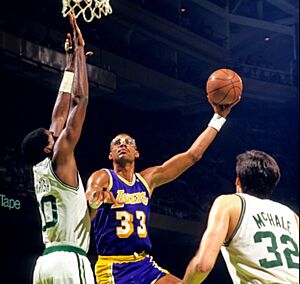
The Lakers drafted Magic Johnson in 1979. Magic's arrival started the Lakers' "Showtime" era in the 1980s. They reached the NBA Finals eight times and won five championships. Abdul-Jabbar continued to be one of the greatest players. He won his record sixth MVP award in his first season with Johnson (1979–80). In the 1980 finals, Abdul-Jabbar averaged 33.4 points. He sprained his ankle in Game 5 but finished the game with 40 points. The Lakers won the title, and Johnson was named Finals MVP.
Abdul-Jabbar kept averaging 20 or more points per game for the next six seasons. The Lakers won another championship in 1981–82. In 1984, Abdul-Jabbar broke Wilt Chamberlain's record for most career points in the NBA. He scored the record-breaking points with his famous skyhook shot.
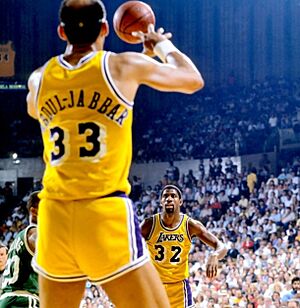
The 1984–85 season was expected to be Abdul-Jabbar's last. But he decided to keep playing. He won his second Finals MVP in 1985. He became the oldest player to win the award at 38 years old. He played very well in the series against the Celtics. The Lakers won the title, ending the Celtics' streak of eight straight championships against them.
Final Playing Years
Abdul-Jabbar played in his 17th season in 1985–86, setting a new NBA record for seasons played. He signed a new contract and continued to play. The Lakers reached the NBA Finals in each of his last three seasons. They won a championship over Boston in 1987.
The Lakers won another championship in 1988, beating the Detroit Pistons. Abdul-Jabbar, at 41 years old, announced he would play one more season before retiring. He received standing ovations and gifts at games during his "retirement tour." In his final regular season game, all the Lakers wore his trademark goggles. The Lakers lost to the Pistons in the 1989 finals.
When he retired, Abdul-Jabbar held records for most career games played (1,560), most minutes played (57,446), most field goals made (15,837), and most points (38,387). He also had the most 1,000-point seasons (19).
Coaching Career
After retiring as a player, Abdul-Jabbar became interested in coaching. He wanted to share his knowledge of the game. He had a reputation for being quiet and serious during his playing days. This sometimes made it hard for him to get coaching jobs.
He worked as an assistant coach for the Los Angeles Clippers and the Seattle SuperSonics. He helped young centers on those teams. In 2002, Abdul-Jabbar was the head coach of the Oklahoma Storm in the United States Basketball League. He led them to the league championship that season. He later returned to the Lakers as a special assistant coach for six seasons (2005–2011). He helped mentor their young center, Andrew Bynum. He stopped coaching in 2013.
Player Style
Abdul-Jabbar was a very strong player near the basket. He was 7 feet 2 inches tall and weighed around 240 to 250 pounds. He was known for his quickness and speed. Later in his career, he gained more weight to help him guard under the basket.
He was famous for his special shot called the skyhook. He could shoot it with either hand. He would raise the ball high above his head, making it very hard for defenders to block. His skyhook helped him have a high field goal percentage throughout his career. He was also known for making important shots in close games.
Abdul-Jabbar was also a great defensive player. He was chosen for the NBA All-Defensive Team eleven times. He was excellent at blocking shots, averaging 2.6 blocks per game. He was not the most aggressive rebounder, but his height helped him grab many rebounds. His teammates called him "Cap" or "Captain" because he was a natural leader.
He stayed in great shape with a strict fitness plan. He started doing yoga in 1976 to improve his flexibility. He said he could not have played for 20 years without yoga. He played in 95 percent of his team's regular-season games. He played 80 or more games in 11 of his 20 seasons. Five times, he played in all 82 games.
Abdul-Jabbar started wearing his famous goggles after getting poked in the eye during a game in 1974. He wore them for many years to protect his eyes.
The Skyhook Shot
The skyhook was Abdul-Jabbar's signature move. It was a hook shot where he released the ball at the highest point of his arm's motion. He could shoot it from up to 16 feet away. Because of his long arms and height, it was almost impossible for defenders to block without committing a foul. He also used his non-shooting arm to keep defenders away. He learned the shot in fifth grade and practiced it a lot.
Legacy and Impact
Kareem Abdul-Jabbar won a record six MVP awards. His 38,387 career points were the NBA's all-time scoring record for nearly 39 years. This was the longest time anyone held that record in league history. His skyhook is considered one of the most unstoppable shots ever. He won six NBA championships and two Finals MVP awards. He was chosen for 15 All-NBA teams and 11 All-Defensive Teams. He was also selected for 19 All-Star teams, a record until 2024.
Abdul-Jabbar was named to the NBA's 35th, 50th, and 75th anniversary teams. He averaged 24.6 points, 11.2 rebounds, 3.6 assists, and 2.6 blocks per game in his career. He is the NBA's third leading all-time rebounder (17,440). He is also third all-time in blocked shots (3,189), even though blocks were not recorded until his fourth year in the league.
Many experts and basketball legends consider Abdul-Jabbar one of the greatest players ever. In 2007, ESPN voted him the best center of all time. In 2015, ESPN named him the best center in NBA history and ranked him No. 2 among the greatest NBA players ever, behind Michael Jordan.
In 1978, Abdul-Jabbar was the first NBA player to sign a sneaker endorsement deal with Adidas. He also became the first player to have his own signature shoe.
NBA Career Statistics
| Legend | |||||
|---|---|---|---|---|---|
| GP | Games played | GS | Games started | MPG | Minutes per game |
| FG% | Field goal percentage | 3P% | 3-point field goal percentage | FT% | Free throw percentage |
| RPG | Rebounds per game | APG | Assists per game | SPG | Steals per game |
| BPG | Blocks per game | PPG | Points per game | Bold | Career high |
Regular season
| Year | Team | GP | GS | MPG | FG% | 3P% | FT% | RPG | APG | SPG | BPG | PPG |
|---|---|---|---|---|---|---|---|---|---|---|---|---|
| 1969–70 | Milwaukee | 82* | — | 43.1 | .518 | — | .653 | 14.5 | 4.1 | — | — | 28.8 |
| 1970–71† | Milwaukee | 82 | — | 40.1 | .577 | — | .690 | 16.0 | 3.3 | — | — | 31.7* |
| 1971–72 | Milwaukee | 81 | — | 44.2 | .574 | — | .689 | 16.6 | 4.6 | — | — | 34.8* |
| 1972–73 | Milwaukee | 76 | — | 42.8 | .554 | — | .713 | 16.1 | 5.0 | — | — | 30.2 |
| 1973–74 | Milwaukee | 81 | — | 43.8 | .539 | — | .702 | 14.5 | 4.8 | 1.4 | 3.5 | 27.0 |
| 1974–75 | Milwaukee | 65 | — | 42.3 | .513 | — | .763 | 14.0 | 4.1 | 1.0 | 3.3* | 30.0 |
| 1975–76 | L.A. Lakers | 82 | 82 | 41.2 | .529 | — | .703 | 16.9* | 5.0 | 1.5 | 4.1* | 27.7 |
| 1976–77 | L.A. Lakers | 82 | 82 | 36.8 | .579* | — | .701 | 13.3 | 3.9 | 1.2 | 3.2 | 26.2 |
| 1977–78 | L.A. Lakers | 62 | — | 36.5 | .550 | — | .783 | 12.9 | 4.3 | 1.7 | 3.0 | 25.8 |
| 1978–79 | L.A. Lakers | 80 | — | 39.5 | .577 | — | .736 | 12.8 | 5.4 | 1.0 | 4.0* | 23.8 |
| 1979–80† | L.A. Lakers | 82 | — | 38.3 | .604 | .000 | .765 | 10.8 | 4.5 | 1.0 | 3.4* | 24.8 |
| 1980–81 | L.A. Lakers | 80 | — | 37.2 | .574 | .000 | .766 | 10.3 | 3.4 | .7 | 2.9 | 26.2 |
| 1981–82† | L.A. Lakers | 76 | 76 | 35.2 | .579 | .000 | .706 | 8.7 | 3.0 | .8 | 2.7 | 23.9 |
| 1982–83 | L.A. Lakers | 79 | 79 | 32.3 | .588 | .000 | .749 | 7.5 | 2.5 | .8 | 2.2 | 21.8 |
| 1983–84 | L.A. Lakers | 80 | 80 | 32.8 | .578 | .000 | .723 | 7.3 | 2.6 | .7 | 1.8 | 21.5 |
| 1984–85† | L.A. Lakers | 79 | 79 | 33.3 | .599 | .000 | .732 | 7.9 | 3.2 | .8 | 2.1 | 22.0 |
| 1985–86 | L.A. Lakers | 79 | 79 | 33.3 | .564 | .000 | .765 | 6.1 | 3.5 | .8 | 1.6 | 23.4 |
| 1986–87† | L.A. Lakers | 78 | 78 | 31.3 | .564 | .333 | .714 | 6.7 | 2.6 | .6 | 1.2 | 17.5 |
| 1987–88† | L.A. Lakers | 80 | 80 | 28.9 | .532 | .000 | .762 | 6.0 | 1.7 | .6 | 1.2 | 14.6 |
| 1988–89 | L.A. Lakers | 74 | 74 | 22.9 | .475 | .000 | .739 | 4.5 | 1.0 | .5 | 1.1 | 10.1 |
| Career | 1,560 | 789 | 36.8 | .559 | .056 | .721 | 11.2 | 3.6 | .9 | 2.6 | 24.6 | |
| All-Star | 18 | 13 | 24.9 | .493 | .000 | .820 | 8.3 | 2.8 | .4 | 2.1 |
13.9 | |
Playoffs
| Year | Team | GP | GS | MPG | FG% | 3P% | FT% | RPG | APG | SPG | BPG | PPG |
|---|---|---|---|---|---|---|---|---|---|---|---|---|
| 1970 | Milwaukee | 10 | — | 43.5 | .567 | — | .733 | 16.8 | 4.1 | — | — | 35.2 |
| 1971† | Milwaukee | 14 | — | 41.2 | .515 | — | .673 | 17.0 | 2.5 | — | — | 26.6 |
| 1972 | Milwaukee | 11 | — | 46.4 | .437 | — | .704 | 18.2 | 5.1 | — | — | 28.7 |
| 1973 | Milwaukee | 6 | — | 46.0 | .428 | — | .543 | 16.2 | 2.8 | — | — | 22.8 |
| 1974 | Milwaukee | 16 | — | 47.4 | .557 | — | .736 | 15.8 | 4.9 | 1.3 | 2.4 | 32.2 |
| 1977 | L.A. Lakers | 11 | — | 42.5 | .607 | — | .725 | 17.7 | 4.1 | 1.7 | 3.5 | 34.6 |
| 1978 | L.A. Lakers | 3 | — | 44.7 | .521 | — | .556 | 13.7 | 3.7 | .7 | 4.0 | 27.0 |
| 1979 | L.A. Lakers | 8 | — | 45.9 | .579 | — | .839 | 12.6 | 4.8 | 1.0 | 4.1 | 28.5 |
| 1980† | L.A. Lakers | 15 | — | 41.2 | .572 | — | .790 | 12.1 | 3.1 | 1.1 | 3.9 | 31.9 |
| 1981 | L.A. Lakers | 3 | — | 44.7 | .462 | — | .714 | 16.7 | 4.0 | 1.0 | 2.7 | 26.7 |
| 1982† | L.A. Lakers | 14 | — | 35.2 | .520 | — | .632 | 8.5 | 3.6 | 1.0 | 3.2 | 20.4 |
| 1983 | L.A. Lakers | 15 | — | 39.2 | .568 | .000 | .755 | 7.7 | 2.8 | 1.1 | 3.7 | 27.1 |
| 1984 | L.A. Lakers | 21 | — | 36.5 | .555 | — | .750 | 8.2 | 3.8 | 1.1 | 2.1 | 23.9 |
| 1985† | L.A. Lakers | 19 | 19 | 32.1 | .560 | — | .777 | 8.1 | 4.0 | 1.2 | 1.9 | 21.9 |
| 1986 | L.A. Lakers | 14 | 14 | 34.9 | .557 | — | .787 | 5.9 | 3.5 | 1.1 | 1.7 | 25.9 |
| 1987† | L.A. Lakers | 18 | 18 | 31.1 | .530 | .000 | .795 | 6.8 | 2.0 | .4 | 1.9 | 19.2 |
| 1988† | L.A. Lakers | 24 | 24 | 29.9 | .464 | .000 | .789 | 5.5 | 1.5 | .6 | 1.5 | 14.1 |
| 1989 | L.A. Lakers | 15 | 15 | 23.4 | .463 | — | .721 | 3.9 | 1.3 | .3 | .7 | 11.1 |
| Career | 237 | 90 | 37.3 | .533 | .000 | .740 | 10.5 | 3.2 | 1.0 | 2.4 | 24.3 | |
Awards and Honors
![]() Presidential Medal of Freedom (2016)
Presidential Medal of Freedom (2016)
Halls of Fame
- National Collegiate Basketball Hall of Fame – Class of 2007
- Naismith Memorial Basketball Hall of Fame – Class of 1995
- NYC Basketball Hall of Fame – Inaugural Class of 1990
- Pac-12 Conference Hall of Honor – Class of 2003
- UCLA Athletics Hall of Fame – Inaugural Class of 1984
High School
- 2× Mr. Basketball USA (1964, 1965)
- 3× First-team Parade All-American (1963–1965)
NCAA
- 3× National College Player of the Year
- 3× Consensus first-team All-American (1967–1969)
- 3× NCAA champion (1967–1969)
- 3× NCAA Tournament Most Outstanding Player (1967–1969)
- No. 33 retired by UCLA Bruins
NBA
- 6× NBA champion (1971, 1980, 1982, 1985, 1987, 1988)
- 2× NBA Finals MVP (1971, 1985)
- 6× NBA MVP (1971, 1972, 1974, 1976, 1977, 1980)
- 19× NBA All-Star (1970–1977, 1979–1989)
- 15× All-NBA (10× First team, 5× Second team)
- 11× NBA All-Defensive Team (5× First team, 6× Second team)
- NBA Rookie of the Year (1970)
- 2× NBA scoring champion (1970, 1971)
- NBA rebounding leader (1975)
- 4× NBA blocks leader (1974, 1975, 1978, 1979)
- Elected to the NBA 35th Anniversary Team
- One of the 50 Greatest Players in NBA History (1996)
- Elected to the NBA 75th Anniversary Team (2021)
- No. 33 retired by Milwaukee Bucks
- No. 33 retired by Los Angeles Lakers
- November 16, 2012 – a statue of Abdul-Jabbar was unveiled in front of Staples Center in Los Angeles
As head coach:
- USBL champion (2002)
As assistant coach:
- 2× NBA champion (2009, 2010)
Film and Television Appearances
Playing in Los Angeles gave Abdul-Jabbar chances to act. He first appeared in Bruce Lee's 1972 film Game of Death.
In 1980, Abdul-Jabbar played co-pilot Roger Murdock in the movie Airplane! In one scene, a little boy recognizes him. Abdul-Jabbar's character pretends to be just an airline co-pilot. But when the boy says his dad thinks he doesn't "work hard on defense," Abdul-Jabbar's character gets upset and breaks character. He says he has "been busting my buns every night!"
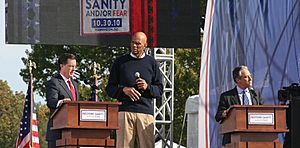
Abdul-Jabbar has been in many other TV shows and movies. He often plays himself. He had roles in movies like Fletch and Troop Beverly Hills. He also appeared in TV series like Full House, The Fresh Prince of Bel-Air, and Scrubs. He played a genie in a lamp in an episode of Tales from the Darkside. He also voiced himself in an episode of The Simpsons.
In 2017, he appeared in the music video for "Good Goodbye" by the band Linkin Park. In the video, he plays a warlord in a dunk contest. In February 2019, he was in an episode of The Big Bang Theory. In 2022, Abdul-Jabbar made a cameo in the Netflix film Glass Onion: A Knives Out Mystery.
Writing and Activism
In 1967, Abdul-Jabbar was the only college athlete to attend the Cleveland Summit. This was a meeting of important Black athletes who supported Muhammad Ali's decision not to fight in the Vietnam War.
Abdul-Jabbar has become a best-selling author. He has written several books, mostly about African-American history. His first book was his autobiography, Giant Steps, in 1983. Other books include On the Shoulders of Giants: My Journey Through the Harlem Renaissance. He also wrote Brothers in Arms: The Epic Story of the 761st Tank Battalion, about a Black armored unit in World War II.
In 2015, Abdul-Jabbar wrote his first adult fiction novel, Mycroft Holmes. It is based on the character from the Sherlock Holmes stories. He has written two sequels to this book.
Abdul-Jabbar often writes and speaks about important topics like fairness and religion. He has written a column for Time magazine. He has talked about how Islam should not be blamed for the actions of violent extremists. He believes it is up to everyone to work against violence.
In 2014, he wrote an essay saying that college athletes should be paid fairly. He believes it's important to end the "indentured servitude" of college athletes. In 2017, he spoke at an event about Ramadan. He talked about how important it is for Muslims and Jewish people to have good relationships.
Government Appointments
Cultural Ambassador
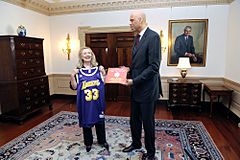
In January 2012, Hillary Clinton, who was the United States Secretary of State, announced that Abdul-Jabbar would be a cultural ambassador for the United States. In this role, Abdul-Jabbar traveled to Brazil to help promote education for young people there.
President's Council on Fitness, Sports, and Nutrition
In 2016, former President Barack Obama appointed Abdul-Jabbar to the President's Council on Fitness, Sports, and Nutrition.
Personal Life
Kareem Abdul-Jabbar met Janice Brown at a Lakers game when he was in college. They married in 1971 and had three children: Habiba, Sultana, and Kareem Jr. They divorced in 1978. He has two other sons, Amir and Adam.
In 1983, Abdul-Jabbar's house burned down. He lost many of his belongings, including his large collection of jazz music albums. Many Lakers fans sent him new albums, which he found very touching.
Religion and Name Change
Alcindor grew up in the Catholic Church but later converted to Islam in 1971. He legally changed his name to Kareem Abdul-Jabbar. This name means "noble one, servant of the Almighty." He chose this name because he wanted to connect with his heritage. Many enslaved people brought to America were Muslims. He felt it was important to reclaim a part of his family's history that had been lost.
His name change was not always easy. It made some people in the United States view him differently.
Health and Wellness
Abdul-Jabbar has had some health challenges. In November 2009, he shared that he had a type of leukemia, a cancer of the blood. He said his condition could be managed with daily medicine. In February 2011, he clarified that his cancer was at a very low level.
In April 2015, Abdul-Jabbar was hospitalized for cardiovascular disease. He had heart surgery on his 68th birthday. In 2020, he shared that he had been diagnosed with prostate cancer years earlier. In February 2023, he spoke about his atrial fibrillation diagnosis, which is an irregular heartbeat. In December 2023, he was hospitalized after breaking his hip in a fall.
Images for kids
See also
 In Spanish: Kareem Abdul-Jabbar para niños
In Spanish: Kareem Abdul-Jabbar para niños
 | Frances Mary Albrier |
 | Whitney Young |
 | Muhammad Ali |


